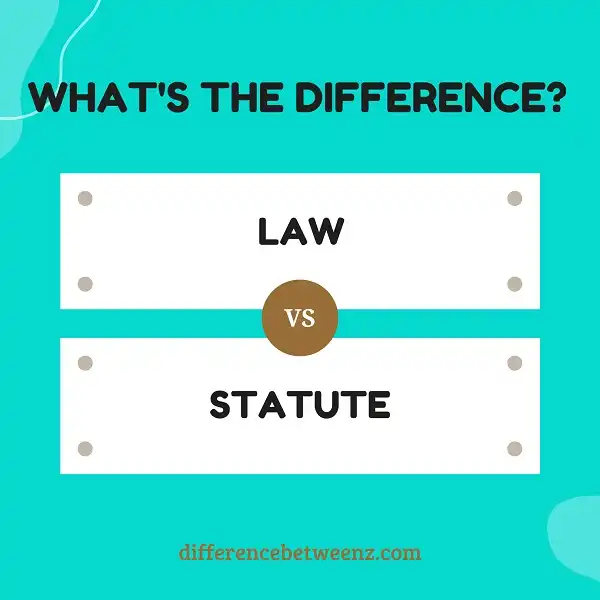Many people use the terms law and statute interchangeably, but there is a distinct difference between the two. Law is a general rule that has been enacted by a legislature, while a statute is a specific law or provision that has been passed by a legislature. Statutes are often collected in codebooks, which are used as reference materials by lawyers, judges, and other legal professionals.
What is Law?
Law is a system of rules that are created and enforced through social or governmental institutions to regulate behavior. It has been defined both as “the Science of Justice” and “the Art of Justice”. Law is a system that regulates and ensures that individuals or a community adhere to the will of the state. State-enforced laws can be made by a collective legislature or by a single legislator, resulting in statutes, by the executive through decrees and regulations, or established by judges through precedent, usually in common law jurisdictions.
Private individuals can create legally binding contracts, including arbitration agreements that may elect to accept alternative arbitration to the normal court process. The formation of laws themselves may be influenced by a constitution, written or tacit, and the rights encoded therein. The law shapes politics, economics, history, and society in various ways and serves as a mediator of relations between people.
What is Statute?
A statute is a written law passed by a legislature on the state or federal level. Statutes are the primary source of law in the United States, and they are enacted at all levels of government. Federal statutes are laws passed by Congress, while state statutes are laws passed by state legislatures. Local ordinances are also statutes, but they are enacted by cities and counties rather than by state or federal legislatures.
- Statutes can be found in several places. The U.S. Code is a compilation of all federal statutes, and it is divided into 50 titles according to the subject matter. The Code of Federal Regulations is a similar compilation of regulations promulgated by executive branch agencies. State statutes are compiled in a similar fashion, with each state having its own code.
- Most statutes take the form of constitutional amendments, statutes passed by Congress, or treaties ratified by the Senate. A constitutional amendment is a change to the U.S. Constitution, and it must be ratified by three-fourths of the states before it becomes law. A statute passed by Congress becomes law if it is signed by the president or if it passes both houses of Congress by a two-thirds majority and is not vetoed by the president. A treaty becomes law when it is ratified by two-thirds of the Senate.
- Once a statute becomes law, it is binding on all citizens and government officials alike. Statutes can be interpreted by courts, and they can be modified or repealed through the legislative process. However, because they are generally enacted through democratically elected bodies, statutes carry considerable legitimacy and authority.
Difference between Law and Statute
There is a common misconception that laws and statutes are one and the same. While both are created by governments and have the force of authority behind them, there are important differences between the two. Law is a general rule that is enacted by a legislature and applies to everyone within a jurisdiction. A statute, on the other hand, is a specific law that is enacted by a legislature in response to a particular problem or issue. In other words, statutes are laws that have been enacted to deal with specific situations, while laws are more general in nature.
While the terms are often used interchangeably, it is important to remember that there is a difference between law and statute. Understanding this distinction can help to ensure that you comply with all of the rules and regulations that apply to you.
Conclusion
The difference between law and statute is an important distinction to understand. Laws are created by the government, while statutes are created by the legislature. Statutes are usually more specific than laws, and they can be amended or repealed more easily than laws. Understanding these differences will help you better understand how your state’s legal system works.


